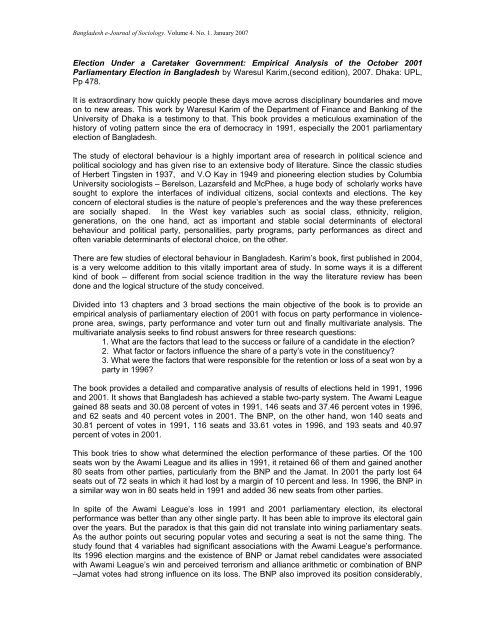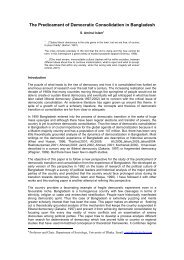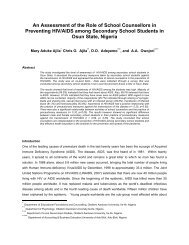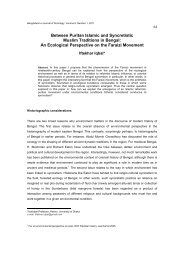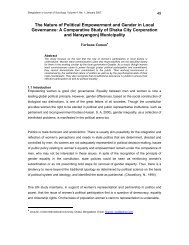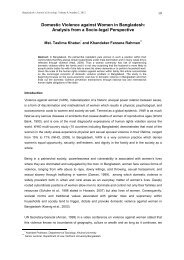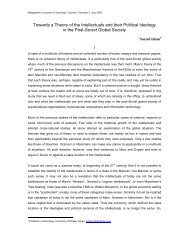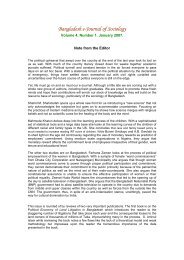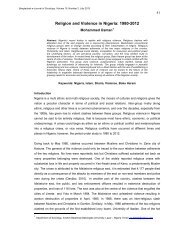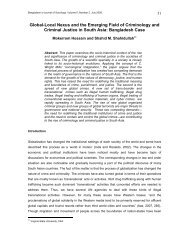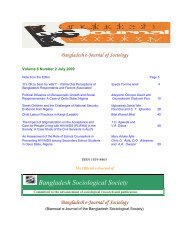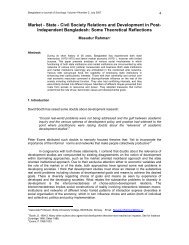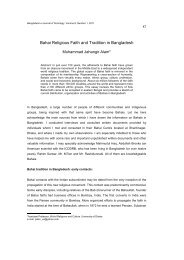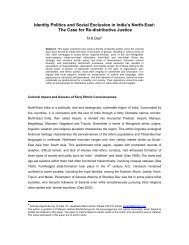Election under a Caretaker Government empirical analysis of the ...
Election under a Caretaker Government empirical analysis of the ...
Election under a Caretaker Government empirical analysis of the ...
Create successful ePaper yourself
Turn your PDF publications into a flip-book with our unique Google optimized e-Paper software.
Bangladesh e-Journal <strong>of</strong> Sociology. Volume 4. No. 1. January 2007<br />
<strong>Election</strong> Under a <strong>Caretaker</strong> <strong>Government</strong>: Empirical Analysis <strong>of</strong> <strong>the</strong> October 2001<br />
Parliamentary <strong>Election</strong> in Bangladesh by Waresul Karim,(second edition), 2007. Dhaka: UPL,<br />
Pp 478.<br />
It is extraordinary how quickly people <strong>the</strong>se days move across disciplinary boundaries and move<br />
on to new areas. This work by Waresul Karim <strong>of</strong> <strong>the</strong> Department <strong>of</strong> Finance and Banking <strong>of</strong> <strong>the</strong><br />
University <strong>of</strong> Dhaka is a testimony to that. This book provides a meticulous examination <strong>of</strong> <strong>the</strong><br />
history <strong>of</strong> voting pattern since <strong>the</strong> era <strong>of</strong> democracy in 1991, especially <strong>the</strong> 2001 parliamentary<br />
election <strong>of</strong> Bangladesh.<br />
The study <strong>of</strong> electoral behaviour is a highly important area <strong>of</strong> research in political science and<br />
political sociology and has given rise to an extensive body <strong>of</strong> literature. Since <strong>the</strong> classic studies<br />
<strong>of</strong> Herbert Tingsten in 1937, and V.O Kay in 1949 and pioneering election studies by Columbia<br />
University sociologists – Berelson, Lazarsfeld and McPhee, a huge body <strong>of</strong> scholarly works have<br />
sought to explore <strong>the</strong> interfaces <strong>of</strong> individual citizens, social contexts and elections. The key<br />
concern <strong>of</strong> electoral studies is <strong>the</strong> nature <strong>of</strong> people’s preferences and <strong>the</strong> way <strong>the</strong>se preferences<br />
are socially shaped. In <strong>the</strong> West key variables such as social class, ethnicity, religion,<br />
generations, on <strong>the</strong> one hand, act as important and stable social determinants <strong>of</strong> electoral<br />
behaviour and political party, personalities, party programs, party performances as direct and<br />
<strong>of</strong>ten variable determinants <strong>of</strong> electoral choice, on <strong>the</strong> o<strong>the</strong>r.<br />
There are few studies <strong>of</strong> electoral behaviour in Bangladesh. Karim’s book, first published in 2004,<br />
is a very welcome addition to this vitally important area <strong>of</strong> study. In some ways it is a different<br />
kind <strong>of</strong> book – different from social science tradition in <strong>the</strong> way <strong>the</strong> literature review has been<br />
done and <strong>the</strong> logical structure <strong>of</strong> <strong>the</strong> study conceived.<br />
Divided into 13 chapters and 3 broad sections <strong>the</strong> main objective <strong>of</strong> <strong>the</strong> book is to provide an<br />
<strong>empirical</strong> <strong>analysis</strong> <strong>of</strong> parliamentary election <strong>of</strong> 2001 with focus on party performance in violenceprone<br />
area, swings, party performance and voter turn out and finally multivariate <strong>analysis</strong>. The<br />
multivariate <strong>analysis</strong> seeks to find robust answers for three research questions:<br />
1. What are <strong>the</strong> factors that lead to <strong>the</strong> success or failure <strong>of</strong> a candidate in <strong>the</strong> election<br />
2. What factor or factors influence <strong>the</strong> share <strong>of</strong> a party’s vote in <strong>the</strong> constituency<br />
3. What were <strong>the</strong> factors that were responsible for <strong>the</strong> retention or loss <strong>of</strong> a seat won by a<br />
party in 1996<br />
The book provides a detailed and comparative <strong>analysis</strong> <strong>of</strong> results <strong>of</strong> elections held in 1991, 1996<br />
and 2001. It shows that Bangladesh has achieved a stable two-party system. The Awami League<br />
gained 88 seats and 30.08 percent <strong>of</strong> votes in 1991, 146 seats and 37.46 percent votes in 1996,<br />
and 62 seats and 40 percent votes in 2001. The BNP, on <strong>the</strong> o<strong>the</strong>r hand, won 140 seats and<br />
30.81 percent <strong>of</strong> votes in 1991, 116 seats and 33.61 votes in 1996, and 193 seats and 40.97<br />
percent <strong>of</strong> votes in 2001.<br />
This book tries to show what determined <strong>the</strong> election performance <strong>of</strong> <strong>the</strong>se parties. Of <strong>the</strong> 100<br />
seats won by <strong>the</strong> Awami League and its allies in 1991, it retained 66 <strong>of</strong> <strong>the</strong>m and gained ano<strong>the</strong>r<br />
80 seats from o<strong>the</strong>r parties, particularly from <strong>the</strong> BNP and <strong>the</strong> Jamat. In 2001 <strong>the</strong> party lost 64<br />
seats out <strong>of</strong> 72 seats in which it had lost by a margin <strong>of</strong> 10 percent and less. In 1996, <strong>the</strong> BNP in<br />
a similar way won in 80 seats held in 1991 and added 36 new seats from o<strong>the</strong>r parties.<br />
In spite <strong>of</strong> <strong>the</strong> Awami League’s loss in 1991 and 2001 parliamentary election, its electoral<br />
performance was better than any o<strong>the</strong>r single party. It has been able to improve its electoral gain<br />
over <strong>the</strong> years. But <strong>the</strong> paradox is that this gain did not translate into wining parliamentary seats.<br />
As <strong>the</strong> author points out securing popular votes and securing a seat is not <strong>the</strong> same thing. The<br />
study found that 4 variables had significant associations with <strong>the</strong> Awami League’s performance.<br />
Its 1996 election margins and <strong>the</strong> existence <strong>of</strong> BNP or Jamat rebel candidates were associated<br />
with Awami League’s win and perceived terrorism and alliance arithmetic or combination <strong>of</strong> BNP<br />
–Jamat votes had strong influence on its loss. The BNP also improved its position considerably,
Bangladesh e-Journal <strong>of</strong> Sociology. Volume 4. No. 1. January 2007<br />
2<br />
especially in urban areas and in <strong>the</strong> Rajshahi Division, particularly areas <strong>of</strong> <strong>the</strong> north Bengal<br />
dominated by <strong>the</strong> JP.<br />
Thus <strong>the</strong> four-party alliance won on <strong>the</strong> basis <strong>of</strong> a combination <strong>of</strong> anti-Awami League forces and<br />
unusual vote swings in 58 constituencies which were violence-prone. In <strong>the</strong>se constituencies <strong>the</strong><br />
Awami League lost with a big margin. The test <strong>of</strong> association found no relationship between party<br />
performance and rural- urban location <strong>of</strong> <strong>the</strong> seats. But interestingly Dhaka led <strong>the</strong> nation in terms<br />
electoral outcome. There was a pounced pro-BNP swing in all <strong>the</strong> seats <strong>of</strong> <strong>the</strong> Dhaka city. A<br />
swing in Dhaka reverberated throughout <strong>the</strong> country.<br />
The author has tried to speculate <strong>the</strong> reasons for <strong>the</strong> AL debacle in <strong>the</strong> capital city. The key<br />
cause seems to have been <strong>the</strong> rise <strong>of</strong> violence in <strong>the</strong> city and its perceived association with<br />
Awami League leaders. “[F]ew cases <strong>of</strong> highly publicized, high pr<strong>of</strong>ile terrorist activates with<br />
which <strong>the</strong> names <strong>of</strong> some Awami league leaders and MPs appeared in <strong>the</strong> newspapers had<br />
made people to align <strong>the</strong> Awami League with terrorism. The government at <strong>the</strong> same time was<br />
not successful in clearing its name from alleged involvement with terrorism as <strong>the</strong>y could not or<br />
did not find out and expose <strong>the</strong> real criminals who were perpetuating <strong>the</strong> crimes”(p, 254). O<strong>the</strong>r<br />
contributing causes were corruption, mismanagement in <strong>the</strong> DCC and its mayor, load shedding,<br />
increase in hijacking, kidnapping and extortions etc.<br />
The author did not find unusual swings in vote in more than 4-5 constituencies which could not be<br />
explained with known factors. The voter turn out was high in 2001 in <strong>the</strong> constituencies in which it<br />
was high in 1996. The voter turn out was low in urban constituencies, medium-level violence –<br />
prone area and where rate <strong>of</strong> increase in voters was high and where 4-party alliance had won in<br />
1996. The author did not check on <strong>the</strong> proportion <strong>of</strong> minority votes which were cast, but <strong>the</strong><br />
average turn out in 146 constituencies in which <strong>the</strong> Awami League won in 1996 was not<br />
significantly different from <strong>the</strong> average for <strong>the</strong> country. But <strong>the</strong> data allow <strong>the</strong> possibility<br />
interpreting that AL and minority voters faced intimidation.<br />
This book has three minor shortcomings. The author has not looked across <strong>the</strong> disciplinary<br />
boundary and does not seem to have consulted, at lest, a part <strong>of</strong> <strong>the</strong> enormous literature on<br />
electoral studies within political science and political sociology.The discrete literature review<br />
(using each work in isolatation) uses mostly journalistic writings from Bangladesh. Thus,<br />
secondly, <strong>the</strong> research design has not been adequately built on <strong>the</strong> basis <strong>of</strong> <strong>the</strong>oretical logic.<br />
Thirdly, <strong>the</strong> conclusion <strong>of</strong> such a good book is disappointing. It provides a very brief overview <strong>of</strong><br />
each chapter ra<strong>the</strong>r than highlighting <strong>the</strong> key findings <strong>of</strong> its <strong>empirical</strong> <strong>analysis</strong>.<br />
The book does not become directly engaged with <strong>the</strong> issue <strong>of</strong> how free and fair <strong>the</strong>se elections<br />
were (free and fair election were cited in 5 different pages in <strong>the</strong> <strong>empirical</strong> section <strong>of</strong> <strong>the</strong> book and<br />
election irregularities in 2) <strong>the</strong> issue that has led to <strong>the</strong> current breakdown <strong>of</strong> <strong>the</strong> democratic<br />
process. But it does provide powerful <strong>empirical</strong> <strong>analysis</strong> <strong>of</strong> why <strong>the</strong> four-party alliance did win. To<br />
reiterate <strong>the</strong> Awami League lost <strong>the</strong> election due to <strong>the</strong> aggregation <strong>of</strong> <strong>the</strong> votes <strong>of</strong> <strong>the</strong> BNP and<br />
<strong>the</strong> Jamat and perceived terrorism. But <strong>the</strong> message <strong>of</strong> <strong>the</strong> book is clear. The voters <strong>of</strong> <strong>the</strong><br />
country have acted rationally. But <strong>the</strong>re are many constituencies where elections were dictated by<br />
<strong>the</strong> show <strong>of</strong> force and most possibly money. This study shows clearly that <strong>the</strong> management <strong>of</strong><br />
elections is a complex process and <strong>the</strong> electoral roll is only one component <strong>of</strong> it.<br />
It also does not <strong>of</strong>fer policy suggestions. The view <strong>of</strong> one who has worked with such a wealth <strong>of</strong><br />
election data on <strong>the</strong> issue might have been very illuminating in a country where both political and<br />
intellectual views are <strong>of</strong>ten shaped by narrow group interest or common sense.<br />
An <strong>analysis</strong> <strong>of</strong> election results does not show <strong>the</strong> way people actually vote or factors that shape<br />
voter’s preferences. It is surprising that in a country where <strong>the</strong>re has been so much controversy<br />
over <strong>the</strong> electoral process, <strong>the</strong>re has been so little <strong>empirical</strong> study on it! This book shows how<br />
badly and urgently we need more studies on public opinion, and quantitative and ethnographic
Bangladesh e-Journal <strong>of</strong> Sociology. Volume 4. No. 1. January 2007<br />
3<br />
study <strong>of</strong> electoral behaviour in <strong>the</strong> country. It might have saved a lot <strong>of</strong> political turmoil in <strong>the</strong><br />
country.<br />
The UPL should be congratulated for bringing out <strong>the</strong> second edition <strong>of</strong> a high quality book with<br />
such care. The book would be indispensable for anybody interested in <strong>the</strong> issues <strong>of</strong> election and<br />
electoral behaviour <strong>of</strong> <strong>the</strong> country.<br />
S Aminul Islam<br />
Pr<strong>of</strong>essor and Chair, Department <strong>of</strong> sociology<br />
University <strong>of</strong> Dhaka. Email: aminuls2000@yahoo.com


